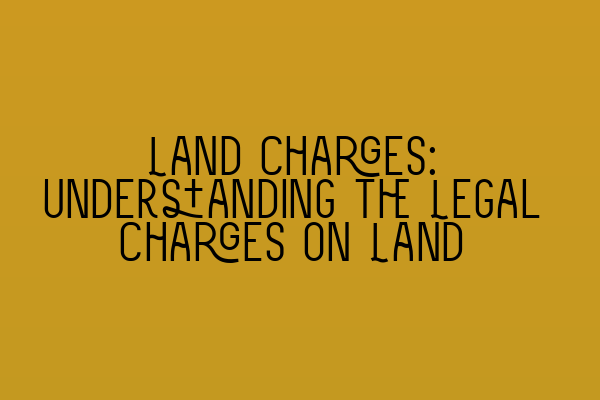Land charges play a crucial role in property law, as they help safeguard the rights and interests of individuals with legal claims on land. As a solicitor at SQE Property Law & Land Law, I understand the importance of comprehending the various types of legal charges that can be imposed on land. In this blog post, I will guide you through the intricacies of land charges, helping you gain a clear understanding of their implications.
What are Land Charges?
Land charges are legal charges that can be registered against a property or parcel of land. They provide notice of certain interests or rights that others may have in the property, ensuring transparency and protecting the rights of potential purchasers or lenders. These charges act as a form of public record, making it essential to conduct thorough searches to ascertain the status of a property.
There are several types of land charges, each serving a specific purpose and providing different levels of protection:
1. Class C Land Charges
Class C land charges are useful in cases where certain interests need to be protected without transferring them onto the registered title. They include restrictions on the sale of land, bankruptcy notices, and charging orders. Class C land charges can significantly impact a property’s marketability and value, making it crucial for potential buyers or lenders to identify any existing charges.
2. Class D Land Charges
Class D land charges relate to equitable interests or rights, such as trusts of land, beneficial interests, or agreements to make a will. These charges are not registered against the title, yet they can be just as significant as Class C charges when it comes to determining the nature of ownership and rights over a property.
3. Class F Land Charges
Class F land charges are associated with local land charges, which are specific to a particular area or region. These charges are often made in connection with planning permissions, tree preservation orders, or enforcement notices. Class F land charges are crucial for understanding any restrictions or obligations that may impact the use and development of a property.
Why are Land Charges Important?
Understanding land charges is essential for several reasons:
a. Protecting Rights
By registering land charges, individuals can protect their legal rights and interests in a property. These charges provide notice to potential buyers or lenders, ensuring that any claims or restrictions are properly considered before transactions take place.
To better understand the importance of protecting rights, read our article on Understanding Contractual Capacity: Rights and Limitations.
b. Assessing Property Value and Marketability
Land charges can have a significant impact on property value and marketability. Purchasers and lenders need to be aware of any charges that may restrict the use or development of a property, as well as the presence of any financial obligations.
To learn more about assessing property value and marketability, take our Interactive SQE Mock Tests for Contract Law: Test Your Knowledge.
c. Long-term Planning and Development
Land charges, particularly Class F charges, are crucial for individuals who have long-term plans for a property. These charges provide information about planning permissions, constraints, or obligations that may impact the development or use of the land.
If you’re interested in long-term planning and development, consider joining our SQE Contract Law Webinars: Expert Insights and Guidance.
Conducting Land Charges Searches
To properly assess the status of land charges on a property, it is essential to conduct thorough searches with the appropriate authorities and registries. These searches may include:
- Land Charges Department searches
- Local Land Charges searches
- Official Copies
- Plan searches
Carrying out diligent searches can ensure that all relevant land charges are identified, providing complete information on the property’s ownership and any restrictions or obligations that may be attached to it.
For a more in-depth analysis of contract law reforms and recent changes, read our article on Contract Law Reforms: An Analysis of Recent Changes.
In Conclusion
Land charges are a fundamental aspect of property law, providing notice and protection for legal interests in land. Understanding the different types of land charges and conducting thorough searches can help individuals make informed decisions when purchasing or financing a property, ensuring that their rights and interests are safeguarded.
To gain further insights into the rights and responsibilities of parties in a contract, visit our article on Parties in a Contract: Rights and Responsibilities.
At SQE Property Law & Land Law, we are here to assist you with all your property law needs. Contact us today to schedule a consultation and benefit from our expertise in land charges and other property-related matters.
